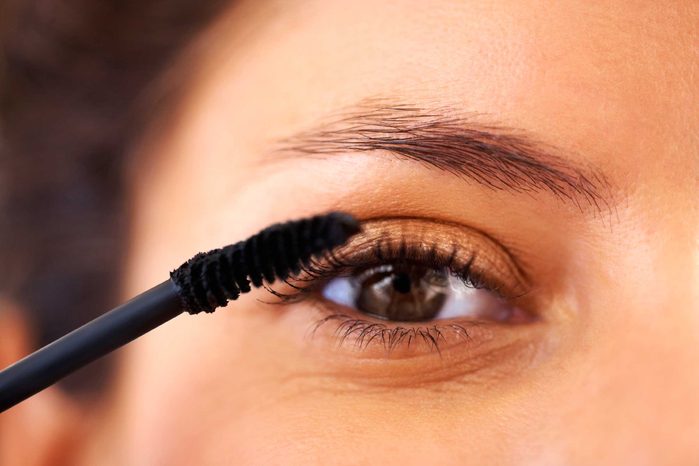
Smell your eye make-up
You have probably never thought about bacteria lurking in your mascara and other eye cosmetics, but germs love these products and can end up causing eye infections. Discard your eye makeup every three months. If you balk at throwing away unfinished (and often pricey) cosmetics four times a year, try the sniff test: Simply smell them before use. “If the makeup smells off, then it is possible bacteria has overgrown in the container and it is best to consider it contaminated and not use it,” warns Benjamin Bert, MD, ophthalmologist at MemorialCare Orange Coast Medical Center in Fountain Valley, California. (This is why you have tired eyes after a long workday.)

Eat sunshine-colored foods
Make sure your dinner plate contains a splash of yellow or orange. Egg yolks and a wide range of orange or yellow vegetables, including carrots and pumpkin, are good sources of zeaxanthin and lutein. These vital nutrients help protect against age-related macular degeneration (AMD), which is the most common cause of blindness in older people. “It is important to eat a diet that incorporates fruits and vegetables of all colors, ranging from the dark green leafy vegetables, like kale, to the orange/yellow foods, like pumpkin and orange peppers,” says Dr. Bert. Here are quick recipe ideas for vision-protecting foods.

Send your children outside
An indoor lifestyle could have a negative effect on children’s eyesight, leading to an increased risk of myopia (nearsightedness).”Currently, our world has shifted to where we are constantly looking at tablets, phones, and computers, which is true for children as well,” explains Dr. Bert. “Correspondingly, there has been a surge in the rates of myopia and high myopia.” Although it’s very rare, it can progress to pathologic myopia or myopic degeneration and lead to loss of vision.” Several studies, however, including this one published in the journal PLoS One, have shown that spending time outdoors slows or prevents the progression of myopia in school-aged children.
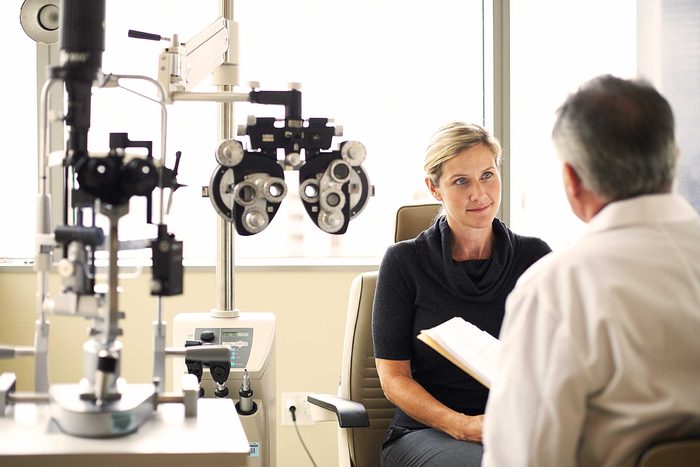
Get tested for glaucoma
Ask your ophthalmologist or optometrist about having a test for this serious eye condition. The disease, a leading cause of blindness, is caused by a rise in pressure inside the eye. Early diagnosis can save your vision because prescription eye drops can prevent the otherwise inevitable damage to the optic nerve. Laser surgery and surgery are also treatment options. The International Glaucoma Association recommends testing at least every two years if you are over 40, closely related to someone with glaucoma, near sighted, diabetic, or of African-Caribbean origin. This common drink might help prevent glaucoma.
Take a break
If you work long hours in front of a screen in artificial light, you are increasing your chances of becoming nearsighted, according to Dr. Bert. Take regular short breaks away from the screen and walk around the office to exercise your eyes as well as your legs. If possible, alternate your work duties so you reduce the length of periods spent in front of a screen. And make a determined effort to get out of the office at lunchtime. One way to remind yourself to take breaks? Set an alarm. Time it to beep every 30 minutes to remind you to look up and away from your computer, preferably at a distant point for at least 30 seconds. Learn about this common eye condition.

Don’t tell the children
You may constantly warn your children of the dire consequences of sitting too close to the TV, but this causes no long-term damage to eyes. The worst it can do is tire your eyes or stress them temporarily, which may cause problems in focusing until they have rested. All the same, it’s better for your child’s eye health to play outside than to sit in front of a screen, at whatever distance. Encourage them to pick up these simple habits that improve your vision.
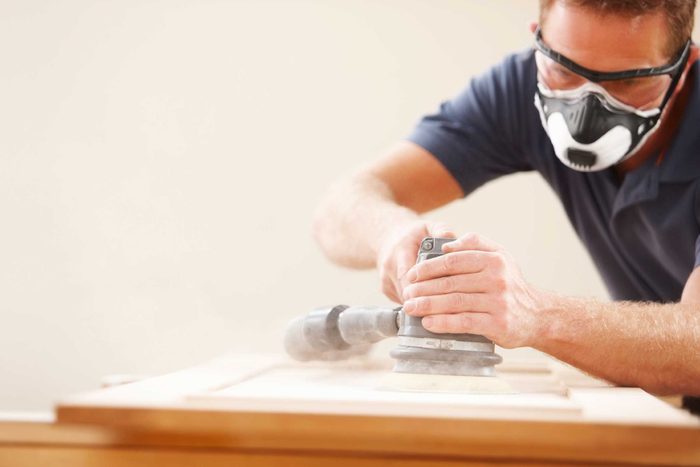
Wear eye protection
You may wear goggles to protect your eyes from chlorine in the swimming pool, but what about other occasions when your eyes may be at risk? If splinters, dust, and other small particles get into your eye, there is a risk of corneal abrasions that could threaten your vision. The American Academy of Ophthalmology estimates that 90 percent of eye injuries could be avoided by wearing protective eyewear. Be sure to safeguard your eyes while cycling, doing DIY jobs (particularly sanding and sawing) and even gardening (bamboo canes, twigs, and thorns can pose a serious hazard to your eyes). These simple habits help protect your eyes.
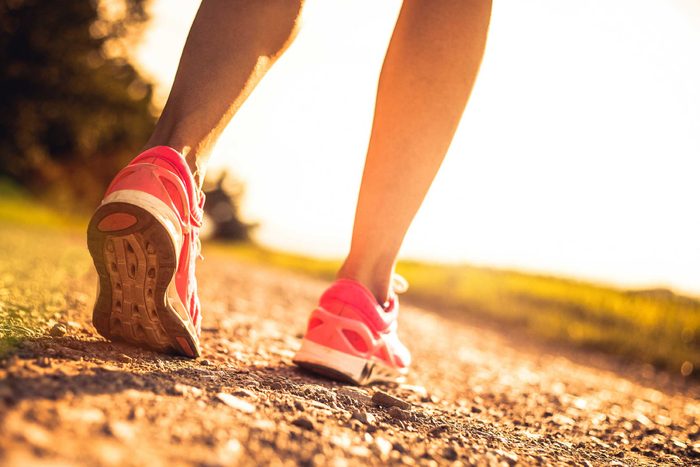
Walk for 40 minutes
Exercise is critical to maintaining cardiovascular health, which also protects the eyesight, explains Dr. Bert. “Multiple studies have shown the benefit of having time outdoors in preventing myopia (nearsightedness) or the progression of myopia,” he says.

Keep clear of smoke
Smoking is as bad for your eyesight as it is for the rest of your body. Research showing a link between age-related macular degeneration (AMD) and smoking is now as robust as that between smoking and lung cancer, with evidence that cigarette smokers are up to four times more likely to be blinded by AMD compared to non-smokers. What’s more, this risk continues for up to ten years after smoking cessation. Here are ways to quit smoking naturally.
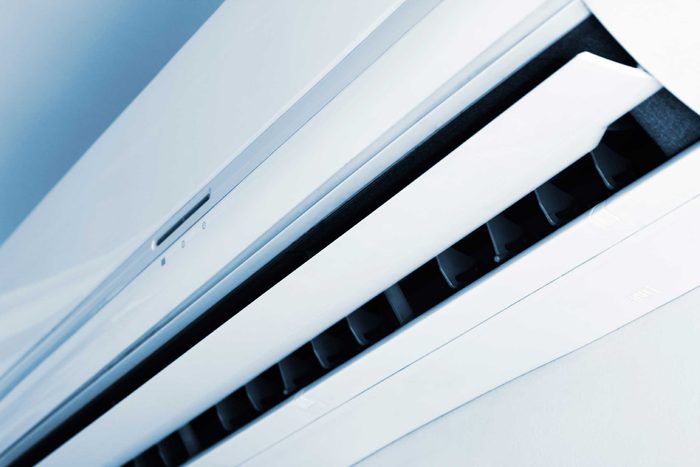
Cool your feet
Make sure that the vents that deliver cool or hot air into your car are aimed at your feet rather than at eye level. Specialists warn that the dry air from car air-conditioning and heating systems sucks moisture out of your eyes, which can cause discomfort and put you at greater risk of eye infections and even ulcers. The same goes for the air conditioning in planes, trains, and even in offices. Check where you are sitting and adjust the vents if you can.

Eat fish for moist eyes
Scientific research suggests that eating oily fish may help prevent dry eye syndrome. This irritating condition, which is common in older people, occurs when the eyes do not produce enough tears or when the tears evaporate too quickly. The result is itchy, red eyes that can be slightly painful. Or try one of these omega-3-rich foods for people who don’t like fish.

Get wraparound protection
You may already know that wraparound sunglasses offer the best protection for the eyes against the damage of ultraviolet rays during sunny weather. Researchers now suggest that wearing sunglasses of this type on a cloudy day is also beneficial for your eye health. Exactly why this is so is not fully understood, but one theory is that the glasses also protect against the drying effects of wind and against pollution. Here’s how to choose the best sunglasses for your face.

Lower the screen
You can reduce your risk of suffering from dry eyes while working at a computer simply by positioning the screen just below eye level. This will mean that your eyes will naturally close slightly when you’re viewing the screen, which minimizes fluid evaporation.
Excerpted from the book Reader’s Digest Health Secrets.
